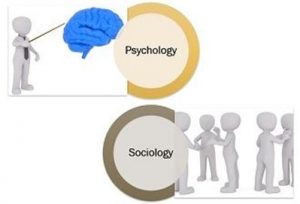Welcome to our Psychology / Sociology Department

Department Staff
| Miss R Quaye | Subject Leader: Psychology and Sociology |
| Miss C Cameron | Teacher of Psychology & Sociology |
| Miss N Coppin | Teacher of Psychology |
Curriculum Intent
The vision of the Psychology and Sociology department is for students to be able to understand the world around them, human behaviour and interaction and the consequences of these. Through investigating conscious and unconscious phenomena, students will build an appreciation of the essential role of psychological research (in fields such as cognition, human biology, psychopathology etc) in maintaining healthy individuals, a stable society and shaping vital institutions within the law, healthcare, education etc.
Through their study of Social Sciences, students will understand historical changes which have influenced the structure and running of our modern world and appreciate the importance of keeping abreast of contemporary societal issues and their influence on behaviour, life choices and opportunities.
The study of Psychology and Sociology will develop students to become expert, analytical thinkers, able to evaluate ideas, processes and procedures to make judgements and draw conclusions. Students will be equipped to become opinionated and confident individuals with a passion for spoken and written debates; skills which will support them in Higher Education, future employment and throughout their lives.
Key Stage 4 & 5 – GCSE / A Level Psychology
At Key Stage 4, students will study for the AQA GCSE Psychology qualification.
The fundamental aims of the psychology programme at Key Stage 4 are for students to:
- Develop fluent knowledge and understanding of psychological studies, theories and concepts
- Developing critical analysis, independent thinking and research skillsTo be able to apply knowledge and understanding of psychological ideas, processes and procedures
- To be able to analyse and evaluate psychological information, ideas, processes and procedures to make judgements and draw conclusions
Year 10
- Social influence
- Research Methods
- Memory
- Development
Year 11:
- Perception
- Language thought and communication
- Brain and neuropsychology
- Psychological problems
Key Stage 5
At Key stage 5 students will have the opportunity to take AQA A-level Psychology.
Students will explore how the human behaviour works all possible underpins that influences our decision making, cognition and behaviour. There is no written coursework and students are assessed solely on their examination performance. Students should therefore be able to read complex material from a wide range of sources, to learn scientific experiments and analyse them using statistics. There are three papers that will be used to test students on the A-level programme:
Paper 1: Introductory topics in Psychology
- Social influence
- Memory
- Attachment
- Psychopathology & Mental Health
Paper 2: Psychology in Context
- Approaches
- Research Methods
Year 13
- Biopsychology
Paper 3: Issues and Options in Psychology
- Issues and Debates in Psychology
- Eating behaviour
- Relationships
- Forensic Psychology
Each paper is 2 hours long and accounts for 33.3% of the qualification.
Key Stage 5 – A Level Sociology
At Key Stage 5, students will study for the AQA Sociology qualification.
Students will explore how the human behaviour influences our culture and society as well as how our society and culture influence us. There is no written coursework; Students are assessed solely on their examination performance. Students should therefore be able to read complex material from a wide range of sources. The A Level is based highly on essay skills. There are three papers that will be used to test students on the A level programme: Paper 1 Education with Theory and Methods, Paper 2 Topics in Sociology, Paper 3 Crime and Deviance with Theory and Methods.
Year 12
Paper 2: Topics in Sociology
- Families and Households
Paper 1: Education with Theory and Methods
- Education
- Methods in Context
Year 13
Paper 2: Topics in Sociology
- Beliefs in society
Paper 3: Crime and Deviance with Theory and Methods
- Crime and Deviance
- Theory and Methods
Each paper is 2 hours long and accounts for 33.3% of the qualification.

